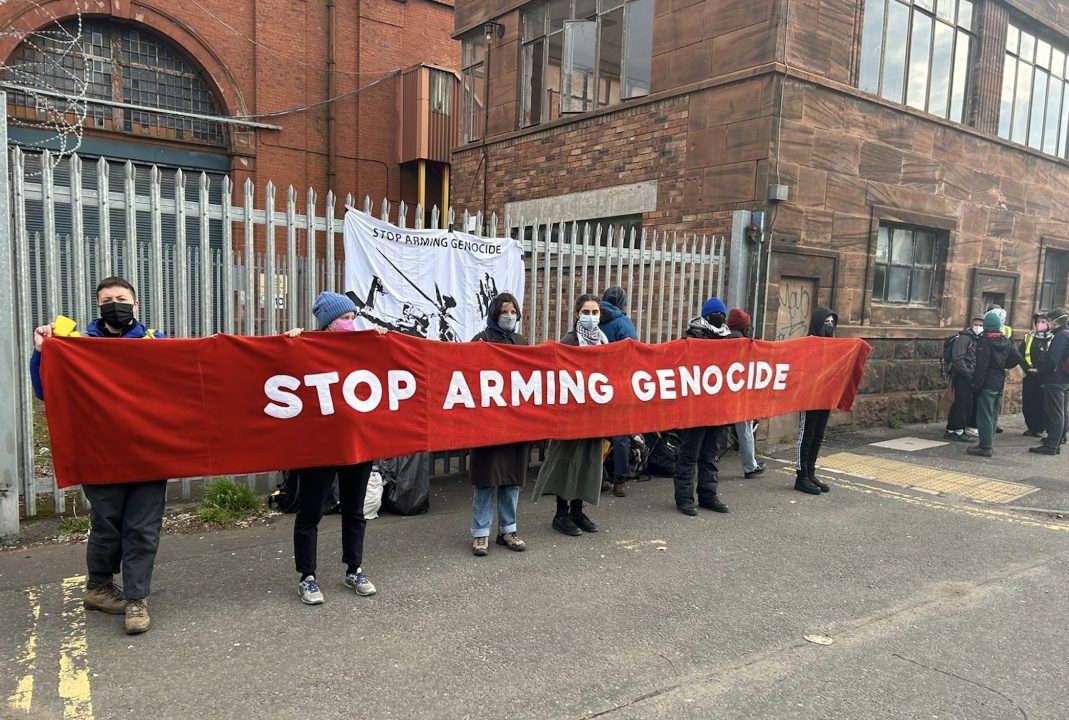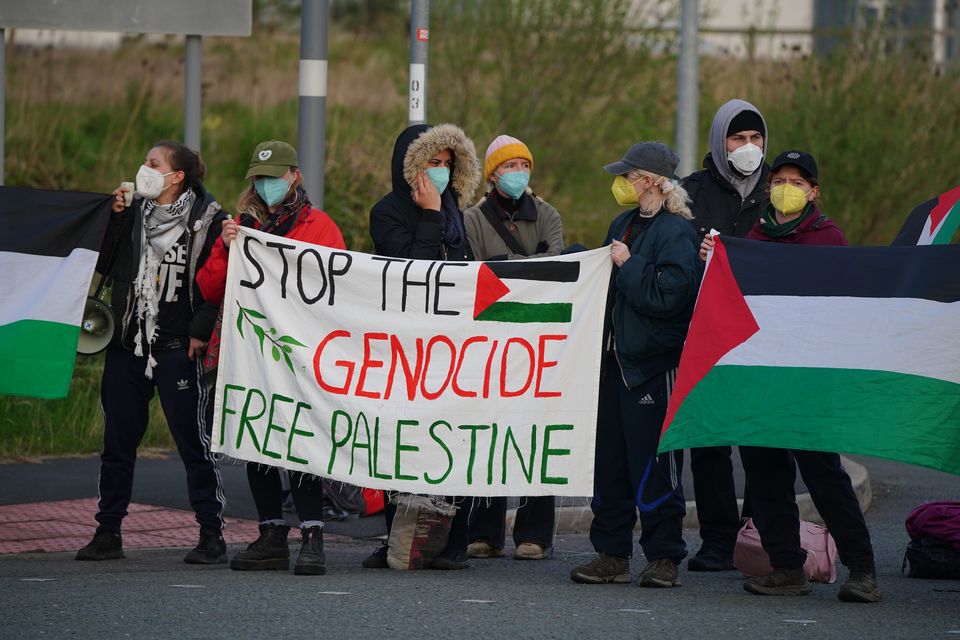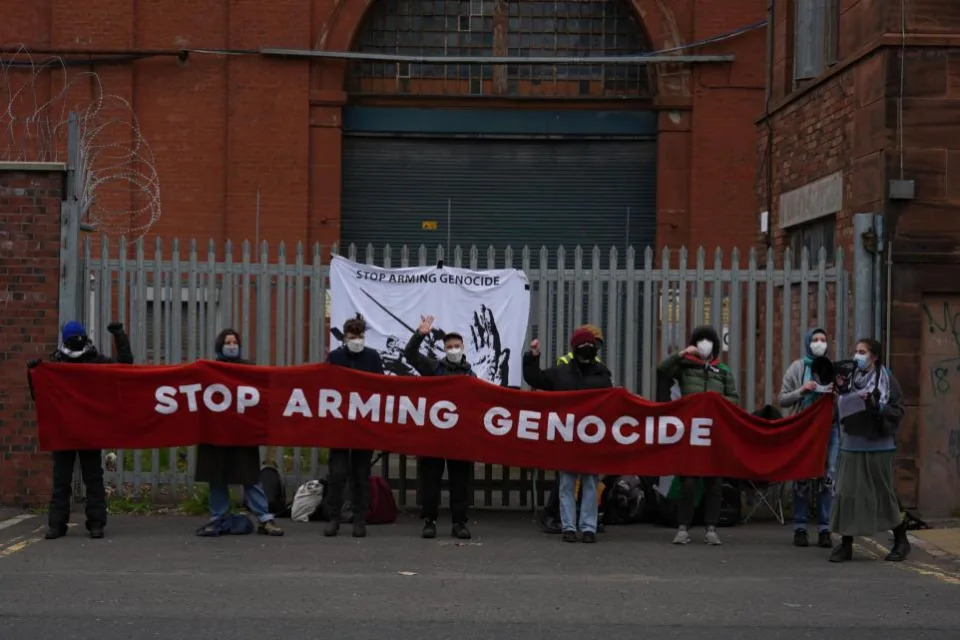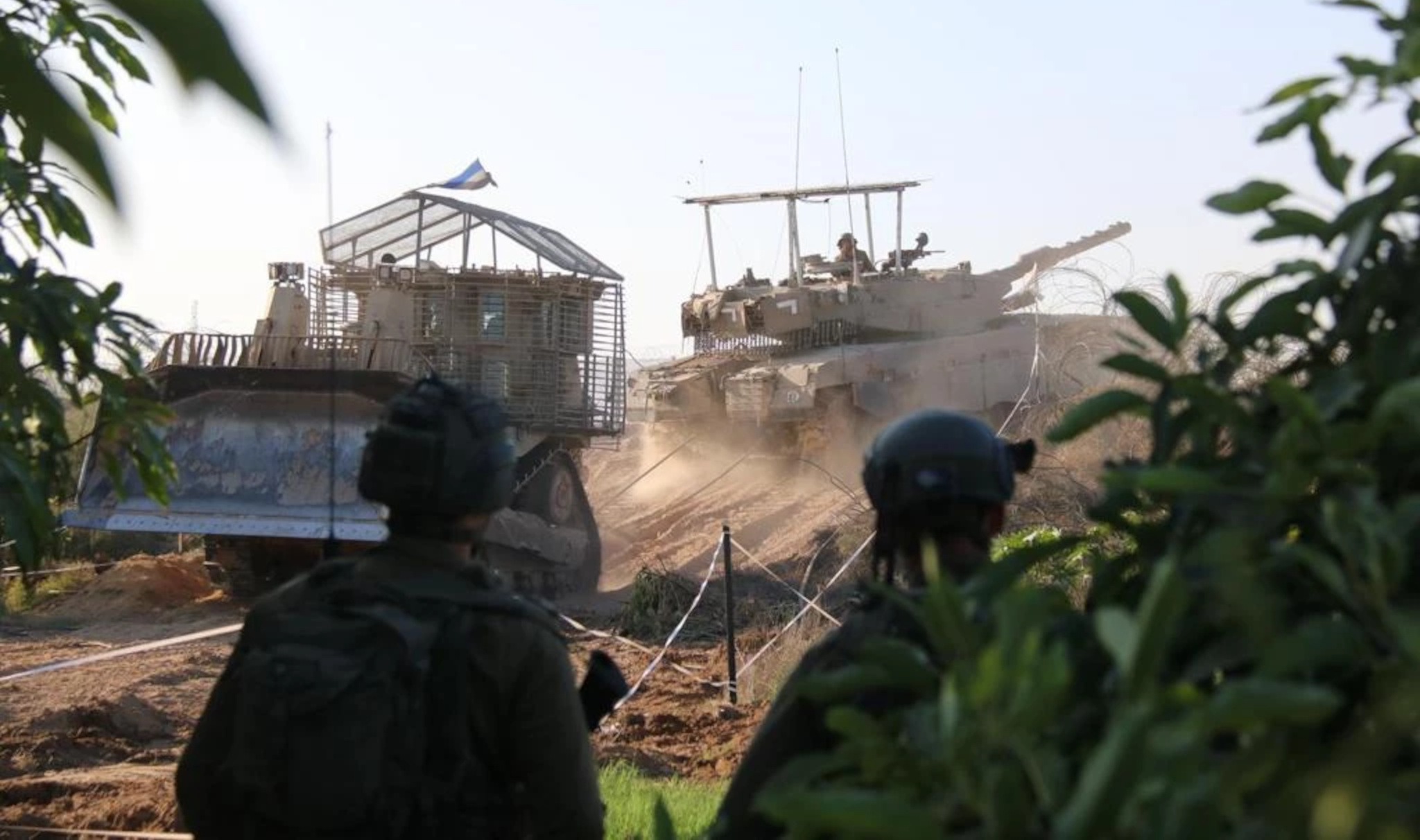The pro-Palestinian demonstration that paralyzed Columbia University ended in dramatic fashion late Tuesday, with police carrying riot shields swarming the Ivy League campus, bursting into an administration building protesters took over the previous night and making dozens of arrests.
Issued on: 01/05/2024 -

“After the University learned overnight that Hamilton Hall had been occupied, vandalized, and blockaded, we were left with no choice,” the school said. “The decision to reach out to the NYPD was in response to the actions of the protesters, not the cause they are championing. We have made it clear that the life of campus cannot be endlessly interrupted by protesters who violate the rules and the law.”
NYPD spokesman Carlos Nieves said he had no immediate reports of any injuries. The arrests occurred after protesters had shrugged off an earlier ultimatum to abandon the encampment Monday or be suspended and unfolded as other universities stepped up efforts to end demonstrations against the Israel-Hamas war that were inspired by Columbia.
Just blocks away at The City College of New York, demonstrators were in a standoff with police outside the public college’s main gate. Video posted on social media by news reporters on the scene late Tuesday showed officers putting some people to the ground and shoving others as they cleared people from the street and sidewalks. Many detained protesters were driven away on city buses.

Police have swept through other campuses across the U.S. over the last two weeks, leading to confrontations and more than 1,000 arrests. In rarer instances, university officials and protest leaders struck agreements to restrict the disruption to campus life and upcoming commencement ceremonies.
Brown University, another member of the Ivy League, reached an agreement Tuesday with protesters on its Rhode Island campus. Demonstrators said they would close their encampment in exchange for administrators taking a vote to consider divestment in October. The compromise appeared to mark the first time a U.S. college has agreed to vote on divestment in the wake of the protests.
Columbia's police action happened on the 56th anniversary of a similar move to quash an occupation of Hamilton Hall by students protesting racism and the Vietnam War.
The police department earlier Tuesday said officers wouldn't enter the grounds without the college administration’s request or an imminent emergency. Now, law enforcement will be there through May 17, the end of the university's commencement events.
Fabien Lugo, a first-year accounting student who said he was not involved in the protests, said he opposed the university’s decision to call in police.
“This is too intense,” he said. “It feels like more of an escalation than a de-escalation.”
In a letter to senior NYPD officials, Columbia President Minouche Shafik said the administration was making the request that police remove protesters from the occupied building and a nearby tent encampment “with the utmost regret.”
Shafik also leaned into the idea, first put forward by New York City Mayor Eric Adams earlier in the day, that the group that occupied Hamilton was “led by individuals who are not affiliated with the university.”
Neither provided specific evidence to back up that contention, which was disputed by protest organizers and participants.
NYPD officials made similar claims about “outside agitators” during the huge, grassroots demonstrations against racial injustice that erupted across the city after the death of George Floyd in 2020. In some instances, top police officials falsely labeled peaceful marches organized by well-known neighborhood activists as the work of violent extremists.
Before officers arrived at Columbia, the White House condemned the standoffs there and at California State Polytechnic University, Humboldt, where protesters had occupied two buildings for more than a week until officers with batons intervened early Tuesday and arrested 25 people.
President Joe Biden believes students occupying an academic building is “absolutely the wrong approach,” and “not an example of peaceful protest,” said National Security Council spokesperson John Kirby.
Later, former President Donald Trump called into Sean Hannity’s show on Fox News Channel to comment on Columbia’s turmoil as live footage of police clearing Hamilton Hall aired. Trump praised the officers.
“But it should never have gotten to this,” he told Hannity. “And they should have done it a lot sooner than before they took over the building because it would have been a lot easier if they were in tents rather than a building. And tremendous damage done, too.”
The nationwide campus protests began at Columbia in response to Israel’s offensive in Gaza after Hamas launched a deadly attack on southern Israel on Oct. 7. Militants killed about 1,200 people, most of them civilians, and took roughly 250 hostages. Vowing to stamp out Hamas, Israel has killed more than 34,000 Palestinians in the Gaza Strip, according to the local health ministry.
As cease-fire negotiations appeared to gain steam, it wasn’t clear whether those talks would inspire an easing of protests.
Israel and its supporters have branded the university protests as antisemitic, while Israel’s critics say it uses those allegations to silence opposition. Although some protesters have been caught on camera making antisemitic remarks or violent threats, organizers of the protests, some of whom are Jewish, say it is a peaceful movement aimed at defending Palestinian rights and protesting the war.
On Columbia’s campus, protesters first set up a tent encampment almost two weeks ago. The school sent in police to clear the tents the following day, arresting more than 100 people, only for the students to return – and inspire a wave of similar encampments at campuses across the country.
Negotiations between the protesters and the college came to a standstill in recent days, and the school set a deadline for the activists to abandon the tent encampment Monday afternoon or be suspended.
Instead, protesters defied the ultimatum and took over Hamilton Hall early Tuesday, carrying in furniture and metal barricades. The demonstrators dubbed the building Hind’s Hall, honoring a young girl who was killed in Gaza under Israeli fire, and issued demands for divestment, financial transparency and amnesty.
Columbia's chapter of the American Association of University Professors said faculty’s efforts to help defuse the situation have been repeatedly ignored by the university’s administration despite school statutes that require consultation.
Ilana Lewkovitch, a self-described “leftist Zionist” student at Columbia, said it’s been hard to concentrate on school for weeks. Her exams have been disrupted with chants of “say it loud, say it clear, we want Zionists out of here.”
Lewkovitch, who identifies as Jewish, said she wished the current pro-Palestinian protests were more open to people like her who criticize Israel’s war policies but believe there should be an Israeli state.
(AP)

MUCH to the consternation of the pathetically insipid Biden administration as well as its rabidly right-wing Republican opposition, student protests over the unfolding genocide in Gaza have been spreading throughout the US. They offer hope, which has been in short supply. At the same time, for the Zionist right they unintentionally serve as a distraction from the very atrocities that enrage most of the protesters. The main story is still unfolding in a starving Gaza, just as it was five or six decades ago in a beleaguered but unbending Vietnam.
That does not, of course, render it irrelevant or even peripheral. The vast demonstrations demanding an end to American apartheid in the 1960s and the subsequent mobilisations against the Vietnam War challenged both state and federal administrations, and contributed to the end of that horrific conflict in 1975.
In the preceding years, it wasn’t uncommon for those involved in the resistance to be derided as pinkos, reds or communist dupes, in a reflection of the recent McCarthyist era. These days the charge is antisemitism. That weapon, too, is hardly new. It has been deployed over the decades against anyone who questioned Israel’s predilection for ethnic supremacism. What’s relatively unusual is the extent to which young Jewish Americans are revolting against their nation’s attachment to the Zionist state that most of their parents’ generation embraced.
To some extent, residual right-wing antipathy towards Jews springs from the left-wing inclinations of many of their intellectuals. American science and culture would have considerably been diminished without the input of Jewish immigrants from Europe. They also enriched America’s political landscape, reflected lately in both Senate majority leader Chuck Schumer and independent senator Bernie Sanders.
The past is prelude on US campuses today.
Schumer attracted the headlines when, as the highest-ranking Jew in American politics, he mildly denounced the inclinations of the Likud-led regime in Israel and called for an election to replace Benjamin Netanyahu. That contributed to the Democratic effort to focus resentment on the current Israeli PM and his despicable regime, instead of accurately recognising Israel’s consistent drift towards dispossession and potential genocide ever since the Nakba.
There is evidence that many young Jews won’t be fooled by the ‘hasbara’ narratives that entrapped their elders or the fantasy that Zionism is an essential component of Jewish identity. As many of them have recognised, after their exposure to anti-Zionist Jews and Palestinians at university, the essence of Jewish experience embodies a concept of humanity that Netanyahu and his acolytes fail to recognise. That poses a problem for Zionism’s biggest assets — its useful idiots in the US, a category that ranges from the president to most legislators and much of the bureaucracy.
Something has changed, though, in the past couple of decades in the US and Israel. No US president has been unfriendly towards Israel, but some have challenged its excesses. All of them have known that Israeli militarism relies on US beneficence. That remains intact even as Biden administration pretends to challenge Israeli excesses while supplying the weapons required to perpetrate the atrocities.
Almost a century ago, Americans who militated against the death of democracy in Spain in the 1930s were categorised as ‘premature anti-fascists’. They were rarely accepted into mainstream politics even during the Soviet alliance during World War II. The McCarthyism that descended after that war, disproportionately targeting Jews, violated every principle that the US purports to worship. Since then at least, free speech has been a right reserved for adherents to the officially sanctioned mainstream.
That has occasionally been disrupted in decades gone by. But perhaps never so potently as in recent months. Despite Netanyahu and Biden’s best efforts, the frequently nonsensical claim of antisemitism no longer carries much weight.
Woody Guthrie had the river, rather than the university, in mind when he wrote more than 80 years ago, “Roll on, Columbia, roll on/ Your power is turning our darkness to dawn”. Some 20 years later, his spiritual descendant Bob Dylan reminded “mothers and fathers throughout the land” not to “criticise what you can’t understand” because “your sons and your daughters are beyond your command”. That echoes, in a way, the early 20th-century Lebanese poet Kahlil Gibran’s well-known warning: “Your children are not your children./ They are the sons and daughters of Life’s longing for itself.”
When “Life’s longing for itself” is being strangled in Gaza or anywhere else, surely it is incumbent upon anyone with a humanitarian impulse to resist it. Whether or not the rebellion across US campuses achieves its aims, gratitude is owed to those who tried.
mahir.dawn@gmail.com
Published in Dawn, May 1st, 2024
New era of realisation

IT was about two weeks ago that students at Columbia University in New York City set up an encampment on the campus’s South Lawn. Students for Justice in Palestine, along with other affiliated groups, said that it was establishing a ‘liberated zone’ and a ‘People’s University’ in protest against the fact that all universities in Gaza have now been destroyed. Everybody knows what happened in the days that followed: Columbia’s president, the Egyptian-born Manouche Shafik, sent in the New York police to clear the encampment.
It was a move that backfired, mostly because the subsequent images showed heavily armed police officers in kevlar vests dragging teenage girls in keffiyas. The youngsters had been peacefully protesting. Since then, the encampments have spread like wildfire across the US. Over the weekend, hundreds of people were arrested at campuses all across the country.
The obvious discussions around the protests have centred on how they show a groundswell of support among young Americans for those suffering in Gaza. However, the protests represent something more than just that in terms of what they say about the American political system and the place of young people in it.
In a superficial sense, the tenacity of the protesters and the fact that they are so many of them present a conundrum for both the Republican and the Democratic parties. In the case of the former, right-wing politicians from Senator Lindsey Graham to ex-Trump adviser Steve Bannon have made elite universities, in fact universities in general, a target of their criticism. To enhance the Republican appeal to a rural population, a large section of which does not attend university, they have criticised the institutes for promoting socially liberal ideas and suppressing conservative speech. Ironically, Republican House Speaker Mike Johnson, who visited Columbia last week and demanded that pro-Palestinian speech be suppressed, is one of the people to have criticised the lack of free speech at universities.
The Democrats do not know what to do with the pro-Palestinian protesters either. This is because both party politicians have long taken huge caches of cash from Jewish lobbyist organisations such as the AIPAC to run their campaigns. However, to come to power, many Democratic politicians, President Joe Biden chief among them, have relied on young voters. So while they would like to ignore the protesters and young people in general, the fact that two-thirds of the 18-29-year age group, polled by the New York Times in 2023, said that Israel should stop its killing of Palestinians, is threatening their hopes of staying in power. Forty eight per cent of the same age group said that Israel was intentionally killing civilians.
The fear in the American political system is indicative of the shifting demographics of leadership, for which Washington is largely unprepared.
Neither party has a plan as to what to do about it and it is reflected in their hand-wringing over the protests.
The fear in the American political system is also indicative of the shifting demographics of leadership, for which Washington, D.C., is largely unprepared. The students who are protesting at the campuses reveal the racial and intellectual demographics of the future. They are a mix of Asian, South Asian, Middle Eastern, African American and other minority groups, who are inching out white students with lower test scores and less dazzling resumés.
Generationally, they could not be farther from the make-up of the current politicians in Washington, who are on average over 60 years old and have little idea of the inclusive worldview that these students have. The fear of both Democratic and Republican politicians relates to what to do about Gaza on one level, but on another level, it is about what will happen when this generation, graduating from the world’s top universities and expected to lead both politics and business, is in power.
In this sense, the student protests and the politics they reveal are indicative of the end of an era. For a long time, US foreign policy prided itself on its ruthless realpolitik whose architect Henry Kissinger died last November. Now a younger generation is calling into question the blatant hypocrisy that has been visible to the rest of the world for decades. What is the logic of saying we should support Ukraine where an indigenous population is fighting against Russia, but not Gaza whose native population is being bombed and starved asked one student protester on TikTok. As a new era of realisation dawns, it is clear that it will become increasingly difficult for America to maintain its nonchalant attitude towards international law.
As for those who say that the students’ demand that their respective universities divest from businesses that support Israel and its war on and occupation of Arab land will never prevail, there is the case of Portland State University. The university has decided to pause donations from military contractor Boeing in line with students’ demands. Israel has reportedly bought arms from Boeing. While such successes are unlikely to be frequent, it does reflect that at least in some cases the encampments may force universities to, in the words of the protesters, “divest and disclose” their ties.
The protests, and the fact that so many minority students at elite American universities are pro-Palestine and willing to risk arrests and suspensions for the cause, reveal that a shrinking number of white Americans will make up the leadership of the future. Not only will the American future be more racially diverse, it is also likely that it will have a politics that will be remarkably different from the worldview that currently prevails in Washington. The furore on campuses is likely to spread in the next few weeks leading up to college graduations, which will likely be disrupted as well. Generation Z it appears, has had it with the aging remnants of realpolitik and may succeed in ushering in a new era in US foreign policy.
The writer is an attorney teaching constitutional law and political philosophy.
rafia.zakaria@gmail.com
Published in Dawn, May 1st, 2024


 Activists blockading the Department for Business and Trade on Wednesday morning. Polly Smythe
Activists blockading the Department for Business and Trade on Wednesday morning. Polly Smythe









 Photo by Saleh Najm and Anas Sharif Fars Media Corporation is licensed under a Creative Commons Attribution 4.0 International License.
Photo by Saleh Najm and Anas Sharif Fars Media Corporation is licensed under a Creative Commons Attribution 4.0 International License.

